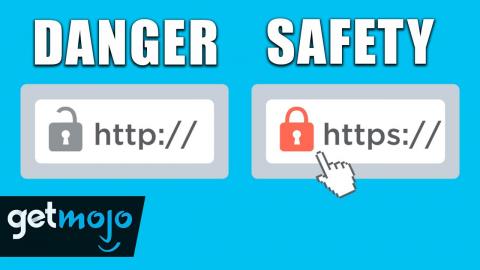Top 5 Privacy Tips For Keeping Your Data Safe Online

Top 5 Privacy Tips for Keeping Your Data Safe Online
What If No One Was Anonymous Online?
Welcome to GetMojo, where we do the research so you don’t have to! In this video, we’re offering our picks for the 5 best Privacy Tips For Keeping Your Data Safe Online. The internet is an amazingly helpful tool - but some people use it for nefarious purposes, like stealing personal information and subsequently selling it to the highest bidder. There are tons of sneaky and sophisticated ways hackers can do this, so knowing the red flags and pitfalls when browsing online can help you stay secure. But what exactly are they? Well, that’s what we’re here to find out. We’ve sifted through numerous articles and help guides to present our 5 top tips. Okay, first up.
Keep Passwords Private and Unique
What If All Computer Data Was Destroyed?
You’re probably sick of hearing about the importance of passwords, but it’s constantly reiterated for very good reason. Passwords are the gateways to a ton of your personal data - including credit card and bank information - so you should always try to make your passwords a mix of upper and lower case letters, numbers and symbols. The harder they are to guess, the harder they are to hack. Conversely, you should avoid simple, easy-to-guess passwords that feature common words, patterns or personal information, like a birthday. It’s also recommended that you change your passwords frequently and don’t use the same passwords for different online accounts. For added protection, you can also activate two-factor authentication, which will notify you and ask for confirmation if someone tries to sign into your account.
Avoid Unknown Links and Downloads
Top 10 Phobias Hardest to Avoid
We’ve all been there, a clickbait link pops up about a celeb or sport - or you receive an email saying you’ve won a competition - and the temptation to click is unbearable. Well, we would highly recommend that you think twice before clicking. Harmful links to websites or downloads, many of which can give hackers access to your computer, come in various different disguised forms. Some can be sent as emails and appear as though they have been sent from your bank, a relative or a utility company. If in doubt, you should contact organisations or relatives directly to confirm that it’s really them. Tell-tale signs can usually be things like suspicious email addresses, spelling errors and random, out-of-the-blue communications with no prior conversation. Just be sure to think before you click.
Only Use Secure Websites
Top 10 Tips on How to Survive Wild Animal Attacks
Similar to the aforementioned clickbait trap, using unsecure websites can also be dangerous, especially if you’re entering your personal info and bank details. A quick way of assessing a website’s legitimacy is to see if it has “https” at the start of its URL - with the “s” in this acronym standing for “secure”. Spelling mistakes littered throughout the website are also a warning sign. To be sure, you can always use a high security web browser, which is designed to spot suspicious websites. But you still have to be on guard. And chances are, your computer already has some added security settings built in to detect things like this, but you just may not have them activated. You can also install an antivirus programme which constantly checks the websites you’re visiting. Some popular brands include Norton, AVG and McAfee.
Use a VPN
Top 7 Tech Items You Should ONLY Buy Online - Gear Up^
You’ll have probably heard the term “VPN” being thrown around a lot lately. But what is a VPN? Well, in simple terms, a VPN — or “virtual private network” — is designed to scramble any information exchanged between your computer and an internet provider - either from home or in a public place like a cafe - so that your information can’t be viewed or stolen. This encryption technology is great because it ensures that even if hackers are present on a network — out of no fault of your own — they will not be able to access your information. NordVPN is one of the best VPNs out there, offering secure connections, lots of servers and highly competitive prices. To learn more about how NordVPN can protect your data online, check out the link in the description.
Don't Overshare on Social Media
Top 20 Normal Social Media Posts with Disturbing Backstories
It’s important to remember that hackers don’t just lurk in the unseen hallways of dubious websites. Unfortunately, you can take every precaution to ensure your security is up to scratch, but still fall victim to hackers through the use of social media - and this is mainly due to oversharing on your end. Avoiding posting things like your social security number is an obvious tip, but even things like your full name, address, and phone number can give hackers tons of information to use against you. It can also be risky posting about personal things like pet names, previous schools and places you grew up, as these can be used to answer security questions on website log-ins. Anything that can be used to build up a personal profile of you should be shared with caution. So how do you ensure your personal data is safe online? Well, simply being extra vigilant can help massively. If a website or email looks suspicious, then avoid it. And if you currently overshare on social media, maybe think twice next time. Some online scams can be incredibly crafty, though, and that’s where security tools like antivirus software and VPNs can have your back. Stay tuned to GetMojo for the most complete video product reviews!







